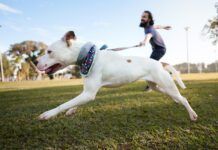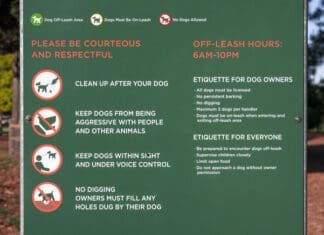Most of us were exposed to “If,” the famous poem by Rudyard Kipling, when we were in high school. If you weren’t required to read it in a literature course, you probably saw it on a poster on a childhood friend’s bedroom wall. You know, it’s the one that begins,
“If you can keep your head
when all about you
are losing theirs,
and blaming it on you . . .”
The poem goes on to list a number of things that the author suggests are prerequisites for being an honorable human. If you can do this and do that, he sums up, then . . .
“yours is the earth and everything that’s in it, And – which is more – you’ll be a Man, my son!”
Recently, a dog lover sent me the following takeoff on Kipling’s poem, by an anonymous author, and containing a surprise ending. He’s got a point. To wit:
“If you can start the day without caffeine,
If you can get going without pep pills,
If you can always be cheerful, ignoring aches and pains,
If you can resist complaining and boring people with your troubles,
If you can eat the same food everyday and be grateful for it,
If you can understand when your loved ones are too busy to give you any time,
If you can overlook it when those you love take it out on you when, through no fault of yours, something goes wrong,
If you can take criticism and blame without resentment,
If you can ignore a friend’s limited education and never correct him,
If you can resist treating a rich friend better than a poor friend,
If you can face the world without lies and deceit,
If you can conquer tension without medical help,
If you can relax without liquor,
If you can sleep without the aid of drugs,
If you can say honestly that deep in your heart you have no prejudice against any creed, color, religion or politics,
Then, my friend,
you are ALMOST as good as your dog.”
Ouch!
Did that zing you, too?
It stings because it’s so on target!
As I read it the first time, I couldn’t help but envision a human who exemplifies all the characteristics contained in the poem. In my mind’s eye, I saw a rather too-perfect, saint-like character. But then suddenly realizing that the author was actually describing a dog . . . It’s with shock that I re-read it and realized, my goodness, almost ALL dogs can fit this description, most of the time!
My favorite line is the one about ignoring a friend’s limited education and never correcting him. When you turn it around the way the author intended and realize that dogs accept our lack of knowledge about them rather calmly, it really points out how dramatic and demanding we can get when we want dogs to learn our ways.
Keep some perspective as you work with your dog – and your friends and family!
-By Nancy Kerns





